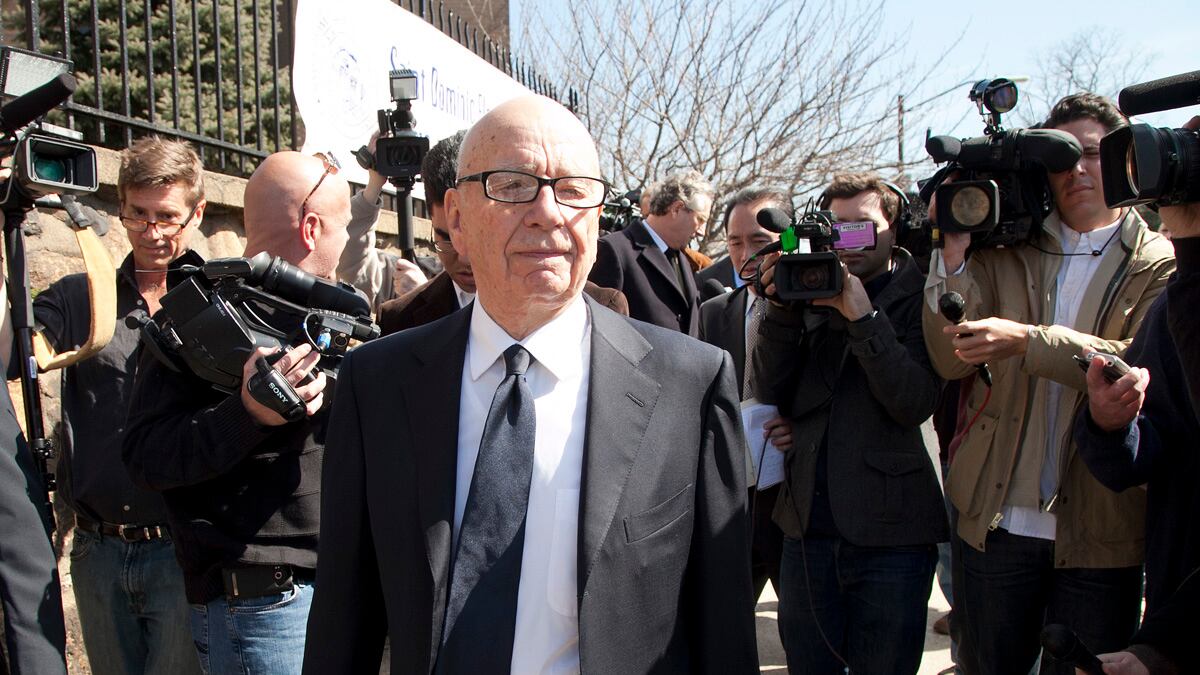It’s a deceptive setting one for one of the best shows in town. The Royal Courts of Justice, appropriately situated between London’s theater land and old press hub of Fleet Street, may look opulent and spacious from outside. Paparazzi shots and TV reports regularly feature the neo-Gothic entrance as they cover celebrity divorces or high-profile libel cases. But inside, the main civil courts are a warren of Victorian corridors in need of a lick of paint. Room 73, where the Leveson inquiry into press ethics has been sitting since last November, with its low ceilings, cheap carpet tiles, and municipal coloring feels like a drab seminar room.
Over the next week, however, this unpromising scene could be the backdrop for some of the most spectacular courtroom drama—a drama that could have ramifications both for the British government and the world’s third-largest media corporation, News Corp., under the dynastic control of the Murdoch family.
On the surface the appearance of James and Rupert Murdoch before the Leveson Inquiry this week might look like a rerun of last July, when father and son were forced to give testimony to a parliamentary select committee over phone hacking at the now defunct News of the World.
However, this week is not a reprise. James and Rupert will appear separately, preventing the previous PR strategy of loyal son defending (and restraining) his octogenarian dad. Instead of being quizzed by a panel of legally untrained MPS, the Murdochs will be under oath and face the forensic cross-examination of Robert Jay Q.C., chief counsel to the inquiry, who has a habit of handing his targets a line of silky rope that they happily tie around their own necks.
Overseeing this, and often intervening to help tighten the knot, Lord Justice Leveson is one of the country’s leading appeal court judges, and has presided over some of the most gruesome criminal cases over the last decade (including the wife of the serial killer Fred West). Even more polite than Jay, Brian Leveson gives off the avuncular air of a kindly head master. But beware. As he peers over his spectacles, Leveson is a big predatory cat that beguiles as he smiles. When he pounces—as he did on a Times lawyer who had apparently misled the High Court—careers and reputations are torn to shreds.
James is first up, with a whole day of interrogation set for this coming Tuesday. At first glance, his position on the witness stand looks the most precarious. Though the younger Murdoch son wasn’t connected to the newspaper business when phone hacking was carried out on an industrial scale at News of the World, he was the executive in charge when evidence about thousands of victims was suppressed, and he authorized massive payouts complete with confidentiality clauses.

On the eve of the first big settlement in June 2008, James was on an email chain that indicated how phone hacking was rife at his Sunday tabloid. James claims he didn’t read the whole chain because it arrived on his BlackBerry when he was helping to look after his young kids. However, he went on to approve an extraordinary $1 million settlement, some 50 times greater than any other previous case of intrusion into privacy.
No matter how implausible, James’s testimony will certainly be well rehearsed. He was recalled to Parliament last November over this issue and recently he has written a plaintive five-page letter to the Select Committee apologizing for his oversights. James is also unlikely to get rattled in cross-examination. Despite youthful rebellion in the form of dropping out of college, drawing satirical cartoons, acquiring piercings and a founding a hip-hop label (Rawkus Records), the 39-year-old now comes across as unflappable, Zen-like, and almost robotically self-controlled. His transatlantic accent is peppered with McKinseyesque management-speak, and when the Labour M.P. Tom Watson accused him last November of being a “mafia boss,” James merely tut-tutted it was “inappropriate.”
Most importantly, well drilled by a phalanx of corporate lawyers, James will stick to script. Any difficult questions that could incriminate him will be met with the pro forma: “I do not recall ... I don’t remember ... Let me get back to you on that.”
Rupert is another proposition entirely. When an M.P. at last summer’s Select Committee referred to the “amnesia” of News International executives, Rupert cut though the euphemism and said, “You mean they’re lying.” His acerbic wit still flickers, as well as his justifiable pride over building up a vast $50 billion conglomerate over the last 60 years.
Humility doesn’t come easy to Rupert. Even though he started his previous appearance in Parliament with the well-rehearsed line—“This is the most humble day of my life”—it got mangled in delivery. Did he mean the day was humble rather than him? Why not the “humblest day” then? Hidden in the grammatical error was the unconscious admission: “This is the most humiliating day of my life.”
As his Twitter feed makes clear, Rupert is irked by these humiliations, and enjoys hammering out ripostes on his iPad, unconstrained by grammar, spelling, or PR handlers. This is where the danger lurks, both for the media mogul’s reputation, but more particularly for the hundreds of associates and politicians who have courted Murdoch senior during his 43 years of dominance in Britain’s press and media.
Last summer, after he confirmed to Parliament that he had visited David Cameron through the “back door” within days of the Coalition government being formed, Murdoch complained about the eight prime ministers who have coincided with his British career: “I wish they’d leave me alone!”
But Rupert Murdoch has found it hard to leave the current prime minister alone. Since Rupert discovered social media at the end of last year, David Cameron has been the most consistent target of his tweet bashings.
The campaign started with his praise for the Scottish Independence Party leader who “showed Cameron the back of his hand.” A month ago Rupert was reveling in the fact that his Sunday Times had uncovered a “cash for access” scandal among Tory Party fundraisers and lobbyists (“What was Cameron thinking?”) and accused him of being anti-business. His tirade against “toffs and right wingers who want last century’s status quo” sounded very much aimed at the old Etonian prime minister.
This is where the real drama lies. The inquiry’s third module is devoted to relations between the press and politicians. Lord Justice Leveson has not only called Tony Blair, Gordon Brown, and David Cameron to testify, but he has also set them up nicely by giving Rupert Murdoch a whole two days on the stand beforehand. This punishing and unprecedented schedule could lead to all kinds of asides by the ageing mogul, whether inadvertent or prepared.
Tony Blair should be relatively immune. His reputation with the anti-Murdoch left has already sunk to its lowest since it was revealed last year that he was godfather to one of Rupert’s daughters with Wendi Deng. Blair has also been pretty mute in his criticism of the Murdoch empire during the scandal, generalizing his complaint to the whole “feral press,” even though his wife, Cherie Blair, is reported to be suing NGN (the holding company for News of the World) for phone hacking.
By contrast, Gordon Brown has savaged News International, calling it a “criminal-media nexus,” but Rupert’s previous response to such attacks has been rueful rather than retaliatory. Both he and the former prime minister have Scottish-manse backgrounds, and share terse, grumpy, and often awkward social manners. By all accounts, the two men got along well during numerous social visits, and so did their wives. Rupert has also reportedly regretted the brutal way the Labour leader was dumped by his U.K. tabloids on the eve of a conference speech in favor of David Cameron.
The current Tory leader is therefore the most vulnerable of all to any of Rupert’s side swipes. Part of this is just the exigencies of office. The Coalition government is currently suffering its worst poll ratings since the election, mainly because of the “omnishambles” of a bungled budget and a looming crisis with their Liberal Democrat partners over reform of the House of Lords. But it seems Murdoch has always had reservations about Cameron.
As Michael Wolff, Murdoch’s biographer who spent hours with the media mogul five years ago, recently told The Daily Beast: “Whenever you talk about David Cameron, [Murdoch] screws up his face and mouths dismissively ‘PR’” (Cameron spent years as a public affairs adviser to a commercial TV channel).
Nonetheless, after an extensive courtship, Murdoch’s papers ultimately backed Cameron in the 2010 election. But that was before the phone-hacking crisis of 2011. When David Cameron responded to public pressure by blocking a News Corp. bid for total control of BSkyB and setting up the Leveson inquiry, Murdoch’s newspapers have been as unremittingly critical as his tweets.
Though 81 years old, Rupert Murdoch is clearly enjoying flexing his media muscle. While James Murdoch inhabits a place somewhere in the stratosphere between Davos and Aspen, and has apparently choreographed a careful retreat from Britain, resigning from a string of chairmanships and directorships here, his father seems to be less willing to disengage.
Though Rupert lived in the UK for only four years and never took out citizenship, he returned with relish to launch the News of the World’s replacement, the Sun on Sunday, in February. From all his statements, both online and through his supposedly “independent” newspapers, Rupert Murdoch seems to have a compelling love/hate relationship with the country that is now examining his record through a public inquiry and several major police investigations.
Humiliated, hounded, but strangely reenergized by this scandal, Rupert Murdoch therefore has the ability to inflict considerable damage on the British political establishment as it calls him to account. Whether this is his last curtain call, or a curtain raiser to a whole new act, don’t be surprised if he tries to bring the house down.





